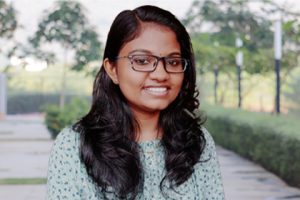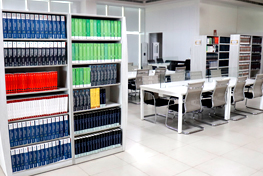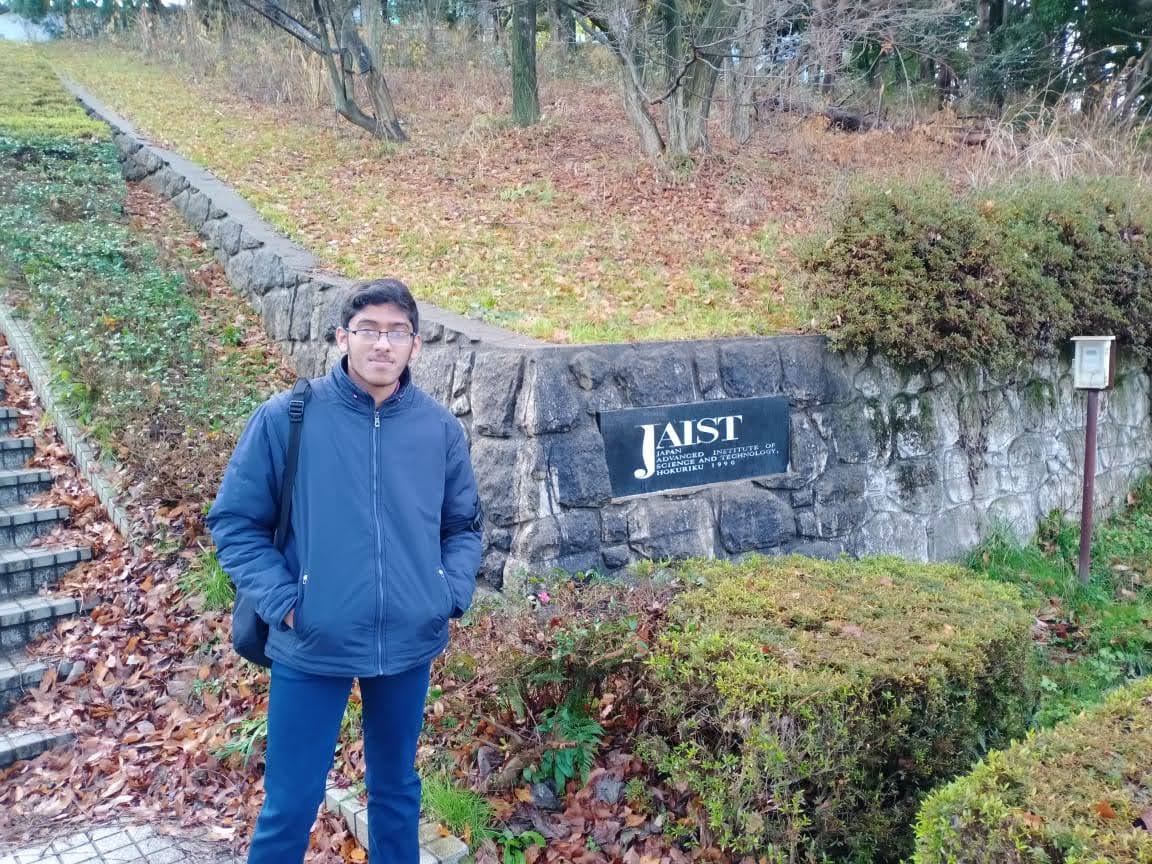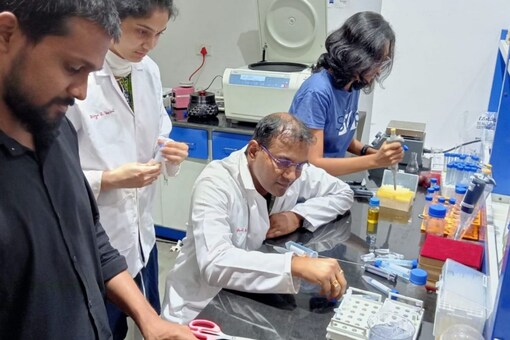Do you think CSIR-JRF is a tough nut to crack? Persistence is the key

“Believe you can and you’re halfway there.” – Theodore Roosevelt
Jesni M Jacob, currently doing research under Dr Mahesh Kumar Ravva narrates her journey to achieving CSIR-JRF All India Rank of 65 through persistent efforts.
I’m working in the field of computational chemistry on designing and developing organic molecules for OLED applications. Securing an AIR of 65 in the CSIR JRF in Chemical Science June 2021 exam is a dream come true moment for me.
In 2019, I completed my post-graduate studies at Madras Christian College, Chennai. The four-year-long journey from zero to JRF AIR 65 was of hard work, patience, sleepless nights, sacrifices and even frustrated moments. It was challenging to remain motivated after multiple unsuccessful attempts. But I wasn’t ready to give up hope. I believed in myself and dreamed big with faith in God Almighty.
My previous attempts didn’t provide me with any hope of continuing my preparation because my marks were consistently far below the cutoffs. That made me realise one thing: without coaching and ample guidance, qualifying for CSIR JRF is a toiling task for an average student. But I learned that with strong passion, proper dedication, and right strategies of do’s and don’ts, any aspiring student can pass the exam with flying colours.
After each attempt, I learned from my mistakes and tried to optimise my strategies. One should never try to cover the entire syllabus and be bothered about it. I analysed the unit-wise weightage and narrowed it down to a few important topics that I found exciting and comfortable.

- Choose topics carefully and focus solely on mastering them.
- Try to stick to and rely on reliable standard textbooks as much as possible.
- The SRMAP library provided me with excellent access to a wide range of standard texts.
The JRF aspirants should try to solve previous years’ questions from standard exams (CSIR, GATE, IISc, etc.) and note new concepts or approaches every day. Enjoy and prepare short notes with a lot of scribbling and highlighting in various colours. Notes should be concise and simple to revise later. But don’t spend too much time making notes.
I made time for exam preparation along with my work and research activities. I’m grateful to my family, teachers, and especially my guide- Dr Mahesh Kumar Ravva, for their constant support and encouragement. He gave me a safe space to express my desire to ace the exam and my anxieties about it. Dr Mahesh always listened to my concerns and helped me to gain clarity on my thoughts. He always encouraged me to dream big and shared his perspectives and lessons from his life experiences. He is a great mentor, motivator, and teacher to me.
- Published in Blog, Chemistry-news, Departmental News, News, Research, Students Achievements
100% Erasmus Mundus Scholarship and MS opportunities in Europe
 SRM University-AP has numerous success stories and student accomplishments to share with the world. What makes the story of Bennet Benny different is the magnitude of his winning and the miles he has crossed after setting foot to achieve his dreams. He has secured the much-coveted Erasmus Mundus Joint Masters Scholarship with a whopping sum of € 33,600 for two years. With the 100% EMJM scholarship, he can now pursue QuanTEEM Master’s across four different universities, each semester in one of these universities:
SRM University-AP has numerous success stories and student accomplishments to share with the world. What makes the story of Bennet Benny different is the magnitude of his winning and the miles he has crossed after setting foot to achieve his dreams. He has secured the much-coveted Erasmus Mundus Joint Masters Scholarship with a whopping sum of € 33,600 for two years. With the 100% EMJM scholarship, he can now pursue QuanTEEM Master’s across four different universities, each semester in one of these universities:
University Bourgogne Franche-Comté (France)
Technische Universität Kaiserslautern (Germany)
Aarhus University (Denmark)
Moskovskiy Fiziko-Tekhnicheskiy Institut (Russia)
Internship at JAIST, Japan -2019
Like every other student, Bennet joined the Bachelor’s degree programme at the Department of Physics in 2018 with an irrepressible desire to dive into the depths of Physics. His undying passion for grasping the subject’s nuances is an influential lesson for all students to emulate. When he was in the second year of his graduate studies, Bennet won the Sakura Science Internship under the supervision of Prof. Ryo Maezono at JAIST, Japan. The internship was funded by the Japan Science and Technology Agency (JST), a government funding agency. For him, this was an excellent opportunity to learn more deeply about quantum mechanics. It also helped him raise his awareness of computational physics, its advantages, uses and the latest research around it.
“I was able to interact with many international scholars and researchers at the Japan Advanced Institute of Science and Technology. It helped me learn about the various ways through which I could fund my higher education. Therefore, after returning to SRM University-AP, I could work in the necessary direction to build my profile accordingly.” Bennet remarked. The enormous lessons he learned there helped him publish a research paper under the guidance of Prof Ranjit Thapa and his PhD students in the Computational Physics laboratory. “The Department of Physics has always motivated me to reach greater heights”, he added.
NTU-India Connect Research Programme 2022
Bennet has also proved his mettle by securing yet another internship opportunity as part of the NTU-India Connect Research Programme 2022. He was selected to spend a semester (Spring term) at NTU, Singapore with a full fellowship during the final year of graduation. As a young researcher, he has gained immense exposure and experience in such a short period giving him a competitive edge to move further in the direction of his dreams. “It has always been my dream to pursue a research career in Physics”, he asserted.
Looking Forward to QuanTEEM Master’s
The QuanTEEM Master’s programme is based on Quantum technologies and provides an excellent opportunity to build a research network in multiple countries in the European Union. He aspires to gain a deeper understanding of quantum mechanics and wishes to use the knowledge to improve our civilisation. In the words of Bennet, “We should never let the fear of failure deter us from trying. I feel that to reach our best potential; we need to face the challenges in life rather than be disheartened by them. Hence, I would encourage my fellow students never to hesitate to seek new opportunities.”
- Published in Academics, Blog, Departmental News, News, Physics News, Research, Sciences
Dr Anil K Suresh’s path-breaking invention helps SRM University-AP “scale” new heights in scientific research!

Dr Anil K Suresh, Associate Professor, Department of Biological Sciences with his team at SRM University-AP has developed a see-through transparent bio-template made from fish scale wastes. The sustainable transparent (over 85% transmittance) bio-template can substitute the use of eco-unfriendly disposal plastic cuvettes for UV-Visible Spectroscopy measurements in the spectrum of 350-900 nm. The path-breaking work to be published in the prestigious Journal of “Green Chemistry” by the Royal Society of Chemistry, is another in the line of extensive, socially, and scientifically relevant research studies that have taken form at SRM University-AP.
The multidisciplinary, research-intensive university since its inception, has emphasized research that has an impact on society. Through projects, collaborations and offering solid support to scholars, it has lived up to its mission of redefining the boundaries of advanced research. The new research by Dr. Suresh and his team comprising Ms Divya Parimi, Mr Chandra Bhatt, Mr Tharun Bollu, Ms Madhura, and collaborators Dr Malli and Mr Jacob is another noteworthy effort in the same vein. Besides minimizing the use of non-biodegradable plastic cuvettes for routine analytics, their bio-template offers many significant benefits.
UV-Vis spectroscopy is a versatile analytical tool used to examine the nature of various synthetic, biological and clinical molecules for pharmaceutical and environmental applications. The analysis is typically performed in a “cuvette or microplate” that is made of expensive quartz or eco-unfriendly plastic materials. The bio-template made from fish scale wastes can not only be an eco-friendly substitute but an effective one too. The team members have clearly demonstrated the practical on-bio template analysis of diverse analytes such as DNA, proteins, nanoparticles, organic dyes, bacteria, BSA assay, and dye-degradations.
Interestingly, the research team also demonstrated the ease in large-scale production of these bio-templates by generating 3000 of them at an affordable price. Dr Suresh, who owns the copyright for the invention after being granted an Indian patent says, “Large-scale development of the bio template can resolve several issues in performing sustainable research.” For starters, it will generate a demand for fish scales, which are usually discarded and can be a cause for foul smell and disease propagation. The use of these bio-templates will also minimize the need for non-biodegradable plastic cuvettes in routine analytics.
Dr Suresh highlights another benefit of the team’s path-breaking research when he says, “Unlike plastic cuvettes that demand a 500-fold analyte, our bio template allows the analysis at shallow 10 microlitre volumes, making it feasible to analyze expensive, rare, and high-risk analytes.” After use, the transparent bio template can be discarded back into the environment without any hesitation, as it is entirely biodegradable. The research that stemmed from the belief that food waste as a bio-resource stratagem has tremendous potential in routine scientific and pharma UV-Vis analytics is living up to that goal.
Dr Suresh is now set to bring the transparent bio-template made from fish scale wastes to the scientific community as a sustainable solution. He is grateful to his team’s efforts and the support he has received from the management at SRM University-AP throughout the research project. “I would like to thank Dr P Sathyanarayanan, President; Prof D Narayana Rao, Pro-Vice-Chancellor, Prof V S Rao, Former Vice-Chancellor and the entire management team for their untiring encouragement, motivation, and support in all my endeavours,” he says as the university “scales” new heights in the world of research, one significant invention at a time.
- Published in Biological Sciences Faculty, Blog, Faculty Achievements, Research
- 1
- 2

